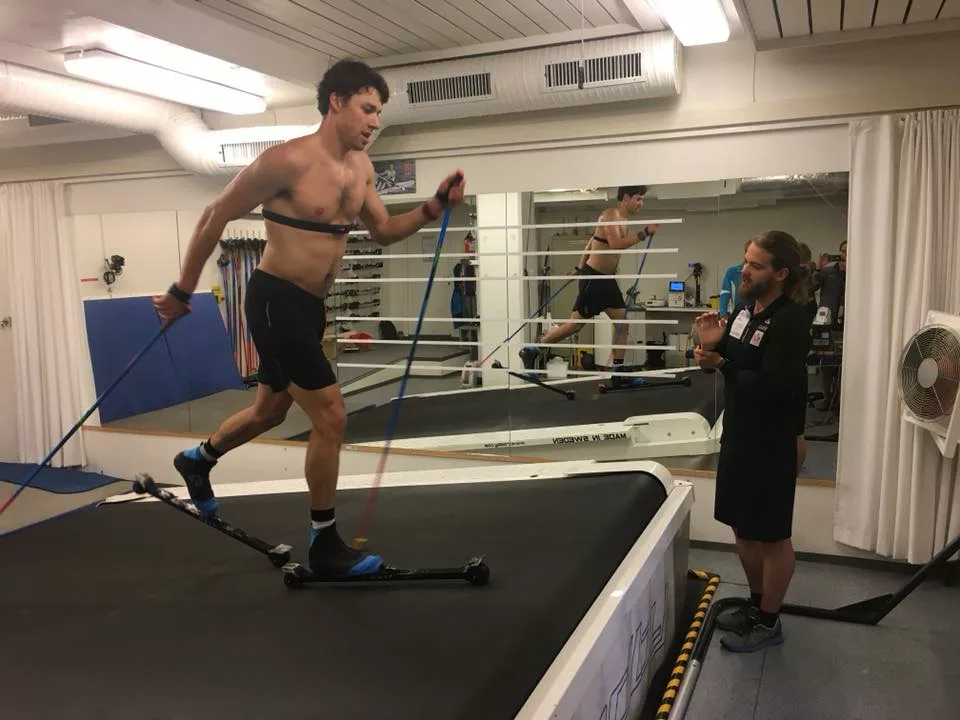
The preparation of an athlete is essential in order to allow him to be able to use his full potential during competitions. We spoke with Charles Castonguay, kinesiologist and physical trainer, a great cross-country skiing enthusiast.
Daniel: You are a full-time physical trainer for Excellence Sportive Québec Lévis, can you tell us about your background and what led you to practice this profession?
I did my baccalaureate in kinesiology at the University of Laval. Subsequently, I did my master's degree and joined the High Level Sports Council of Quebec, which is now called Excellence Sportive Québec-Lévis. It's the INS in Montreal that gives us the money for athletes in the Quebec-Lévis region, and I am hired to work with those athletes.
Initially, I started with the Pierre Harvey Center in cross-country skiing, then with a very high level taekwondo team. Now I still work with the cross-country center. I arrived there by chance, following an internship, but in the end, I developed a love affair with cross-country skiing.
Daniel: what is the difference in the preparation between your role as a physical trainer and that of the coach of the cross-country ski team?
The kinesiologist or physical trainer, his main role is to physically prepare the athlete. In endurance sports, physical preparation is a little more complementary than in power sports. In endurance we will limit ourselves to indoor bodybuilding, training planning to limit injuries, etc.
The trainer, he will do the planning of the training volume, the planning of the intensity sessions, the technique etc.

Daniel: You are a physical trainer in several sports, does it help you to see different sports practices in order to redistribute this knowledge in other sports?
Absolutely. For example, I replaced one of my colleagues who trains an excellent snowboarder, I could see everything he did and it brought me a lot of material to train my cross-country skiers, even if they are completely different sports.
Daniel: You were a trainer for the cross-country ski team, what are the best memories you have of that and how did you feel during the games?
The first word that comes to mind is really: pleasure. I started when I was 20, they trusted me, they took me all over the world with amazing athletes. It's continuous learning because the more you travel, the more you meet other experts who are more knowledgeable than you in many fields. By traveling and developing relationships with new people, it makes you develop your training methods.
It also gave me a good dose of humility, because the performance of the athlete does not depend only on you. There are big successes that bring you a lot of joy and failures, defeats, which also bring you a lot of experience, but you have to manage to make sense of things through successes and failures.
Daniel: We were talking about the different sports that you've coached people in, but at the same time you've seen the same sport in different parts of the world, which gives you a kind of perspective on what you're doing that's very important on your actions now.
When I was at university I thought that the theoretical notions were 80% of the work, and that it would flow naturally if we had the right knowledge. In reality, you learn over the years that in practice when you arrive on the field with the athletes it is rather 50% practical, 50% theoretical.
I would say that a good trainer and a good kinesiologist is always the person who will be able to bring each athlete to their best level and not just apply the same recipe to everyone.
Daniel: You do a lot of running, long-distance trail running, cross-country skiing, etc. Are you your own trainer?
Yes I am my own trainer, but I do not necessarily recommend it to everyone because you are never the best judge of yourself. The problem is that you always want to go further, but no one ever tells you to slow down and that's one of the problems for me.

Daniel: When you travel, how do you manage to combine your training with your work?
Today, I travel a lot less with cross-country skiing, but in the past when I followed them, I did the majority of their low-intensity training with them. It was a great way for me to chat with the athletes to find out how they were feeling and to do a good follow-up.
For the intervals, while traveling, it was often a little more problematic because the schedule is tighter. When I'm in Quebec it's easier because training is scheduled throughout the week and I have several gaps in my schedule to be able to train properly.


Thank you for sharing your experience, it's a very beautiful course you have!!